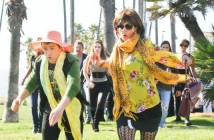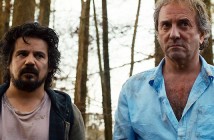
Cast: Jadwiga Jankowska-Cieslak, Andrzej Malec, Wladyslaw Kowalski
Director: Jerzy Kawalerowicz
Country: Poland
Genre: Drama | Horror | Mystery
Editor’s Notes: The following review is part of our coverage for Martin Scorsese Presents: Masterpieces of Polish Cinema which ran from February 5th to 16th. For more information on this film series visit filmlinc.com and follow The Film Society of Lincoln Center on Twitter @FilmLinc.
Often films delve into religion but it feels like most delve into its salvation, its hope, its faith and its goodness. Mother Joan of the Angels is much more complicated than that. It may help promote the selfless sacrifice that religion strives for but it certainly doesn’t entirely condone religion either. Nor does it promote atheism either. The villagers who are outside of the church are tempters who are there to stir the pot, laugh at their rules and seem like heretics. The film seems to want a discussion with Christianity especially but it does dance around the topics of living a careless life too. Satan and bad impulses are equally destructive temptations.
Often films delve into religion but it feels like most delve into its salvation, its hope, its faith and its goodness. Mother Joan of the Angels is much more complicated than that.
Travelling to a small village, a relatively young priest, Father Jozef Suryn (Mieczyslaw Voit) , is sent to exorcise a demonic possession in a parish. While there, he’s confronted with Joan of the Angels (Lucyna Winnicka) who claims to be possessed by many a different demon. Satan starts to use Joan as a vessel to bring out temptations that the priest struggles to fight against. Her main temptation is her overt sexuality now since the possession. She is presented as the gorgeous nun but the most pure and virginal of them all. That was until Satan managed to sully her, possess her and in expose her both mentally and physically.
 Director Jerzy Kawelerowicz has a stylistic authorship on the material, delving into unconventional methods of panning and a special relationship with lighting throughout. Stylish does not, in this case, mean superficial as he delves greatly into the idea of Christianity and especially the institutions of Christianity like the parish. Repression sexuality - something natural - causes problems where it be psychological or inevitable possession from the zealous purity of humanity which is truthfully impure. Questioning religion isn’t the only thing on Kawelerowicz’s mind. There seems to be a questioning of gender. Bringing out sexuality in women seems to daunt the men - which it of course would do in the 17th century. But he questions why a woman’s sexuality threatens men and whether or not it causes fear to their idea of patriarchal society. This could easily be a feminism piece but taken to its extreme of male-dominated culture in a less sophisticated and liberal time.
Director Jerzy Kawelerowicz has a stylistic authorship on the material, delving into unconventional methods of panning and a special relationship with lighting throughout. Stylish does not, in this case, mean superficial as he delves greatly into the idea of Christianity and especially the institutions of Christianity like the parish. Repression sexuality - something natural - causes problems where it be psychological or inevitable possession from the zealous purity of humanity which is truthfully impure. Questioning religion isn’t the only thing on Kawelerowicz’s mind. There seems to be a questioning of gender. Bringing out sexuality in women seems to daunt the men - which it of course would do in the 17th century. But he questions why a woman’s sexuality threatens men and whether or not it causes fear to their idea of patriarchal society. This could easily be a feminism piece but taken to its extreme of male-dominated culture in a less sophisticated and liberal time.
Trouble is caused by a possible overextension of scenes. Character dramas often do require more time and it’s usually a pleasure but there’s some problems, slowness and apathy to them rather than insight.
Not everything is as consuming as the demons in the film unfortunately. Trouble is caused by a possible overextension of scenes. Character dramas often do require more time and it’s usually a pleasure but there’s some problems, slowness and apathy to them rather than insight. This also isn’t helped by performances. There are moments that are possibly ruined for the modern viewer as it can be too difficult to get past laughable, irritating performances. There are some moments where these aren’t the issue, especially between the two leads which share a lot of chemistry and a sexual tension that reeks of repression, but outside of those the cast struggle to muster performances that are effective. Running through a parish like a child with a sheet over your head is only funny. There lies a risk in losing the viewer.
Martin Scorsese would not suggest something terrible or awful and this is far from it. Its stylistic touches are mostly stunning and very few of them miss. The director’s flair really elevates the material that he wrote alongside Tadeusz Konwicki. Lighting is always cleverly used. It could easily be analysed in great detail by academics and probably will be if it already hasn’t. Kawelerowicz has focused on a detailed mise-en-scène throughout, leaving it a strong directorial effort but it seems that the performances needed more work. Perhaps he was so focused on clever cinematography and lighting, as well as putting across its themes, that he suffered in garnering the performances from the lesser characters and especially the nuns. Mother Joan of the Angels is a great piece of work regardless and although its suffered from the mean mistress of time, it is still a clever, well-developed film that offers the audience plenty to think about.
[notification type=”star”]72/100 ~ GOOD. Mother Joan of the Angels is a great piece of work regardless and although its suffered from the mean mistress of time, it is still a clever, well-developed film that offers the audience plenty to think about.[/notification]



